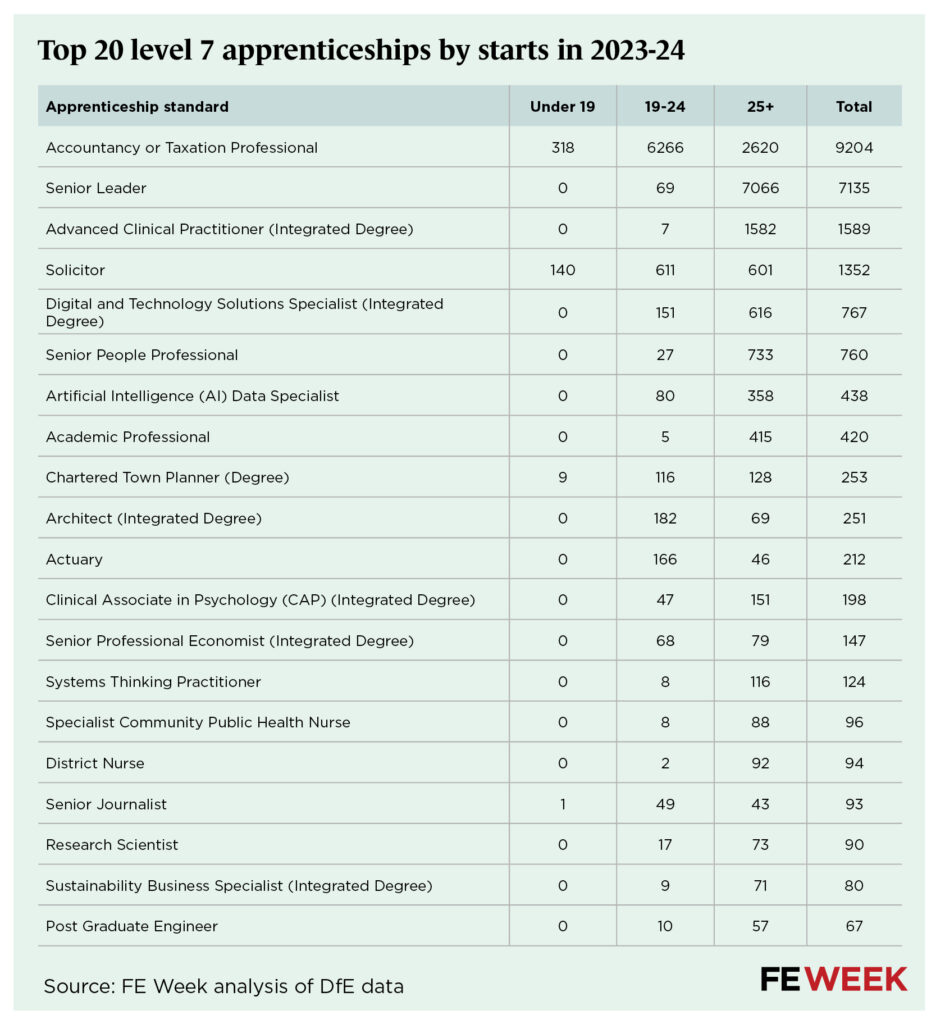Removing public funding for level 7 apprenticeships is “unlikely” to lead to a “significant fall” in the supply of skills in the future, the education secretary has said.
Bridget Phillipson has also revealed that government officials did not find a “strong enough economic rationale” to exempt sector-specific level 7 apprenticeships standards from defunding.
Her comments were made in a written ministerial statement to parliament today following last week’s confirmation of the controversial policy.
As first reported by FE Week, the government will only continue to fund level 7 apprenticeships for those aged 16 to 21 in the future.
This policy will kick in from January 2026 across all sectors.
Experts have warned that the decision will have a dire impact on public service workforces including the NHS and councils.
Phillipson said today that the Department for Education’s new executive agency, Skills England, spoke with over 700 stakeholders to evaluate the impact of defunding level 7 apprenticeships.
They found that “many” learners who completed these apprenticeships saw higher wages one year after study, compared with the average UK salary. It was “also clear that these apprenticeships are important for meeting the skills needs of the economy”.
However, Phillipson said alternative routes are “well supplied” and Skills England’s evidence “suggested there was unlikely to be a significant or unavoidable fall in the supply of these skills in the long term, post-defunding”.
“Therefore, we will be encouraging employers to invest in upskilling their staff to this level, to enable levy funding to be re-balanced towards training at lower levels,” the education secretary added.
Government faced calls for some specific level 7 apprenticeship standards to be exempt from the funding cull, such as the advanced clinical practitioner used in the NHS and chartered town planner used by councils.
But Phillipson said Skills England “did not find a strong enough economic rationale to exempt a small group of level 7 apprenticeship standards from defunding”.
She continued: “While level 7 apprenticeships can be a valuable route for some disadvantaged learners, a significant proportion are from non-deprived backgrounds and are significantly less likely to be deprived than apprentices at lower levels.
“Level 7 generally has a higher proportion of older learners than other apprenticeships, particularly the senior leader apprenticeship (where 99 per cent are over 25) and standards with an embedded postgraduate qualification.”
The education secretary noted that there are “several exceptions” which benefit young people at the start of their careers, like solicitors and accountancy or taxation professionals.

She said this is “why we have decided that younger learners, from all backgrounds, will continue to be funded under our reforms”, and added: “Level 7 apprenticeships are a valuable entry point for young people into good careers, such as law, accountancy and town planning; we have seen thousands take advantage of these opportunities and this will continue under our new approach.”
New data published last week showed that just 11 per cent of the 23,860 starts on level 7 apprenticeships in 2023-24 were by those aged under 22.
Phillipson claimed today that the defunding decision was “informed by a wide range of evidence, including Skills England’s analysis of official apprenticeship statistics and engagement with a wide range of stakeholders”. Officials also “considered wider data and representations and weighed this up against the government’s clear priorities”.
Shadow skills minister Neil O’Brien told FE Week: “Huge numbers of employers and educators have warned the government about the disastrous effect this cut will have on the public services and on access to the professions for the less well off. But they have done it anyway.”
A leaked letter from Phillipson to Cabinet Office minister Pat McFadden, obtained by FE Week last month, suggested the age cap was introduced as a concession to win the support of her ministerial colleagues.
Applications for Technical Excellence Colleges opening soon
As announced at the chancellor’s spring statement in March, £100 million of new investment for ten technical excellence colleges (TECs) will soon be available. This will involve giving existing further education colleges “additional funding to create specialist facilities, equipment, and curriculum for construction courses to directly meet industry needs”.
Around £80 million will be for capital and the remaining £20 million will be for revenue spending, with funds made available from 2025-26.
Phillipson said today that colleges will be able to apply to become “Construction TECs” and the application process will “open this term for ten, to launch in September 2025”.
No further information has been provided at this point.
















Your thoughts